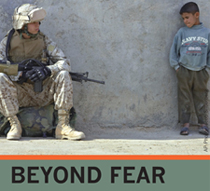For decades before that fateful December day in 2004, Aceh was embroiled in a conflict for independence from the Indonesian government. As unbelievable as it seems, the tsunami's death and destruction helped bring about the one thing many in Aceh had been hoping for for years: peace.
A landmark peace accord was signed in 2005 and the province's first democratic elections were held last December. A former rebel commander was elected governor.
Much of the humanitarian aid flowing to Aceh is directed toward the immediate needs of food, housing, and infrastructure. But a small portion of the United States Agency for International Development's (USAID) assistance is funding projects aimed at securing and keeping the peace.
In the small mountain village of Ronga Ronga, nearly an eight-hour drive from Banda Aceh, former fighters of the Free Aceh Movement are helping to construct a new town market.

The project, implemented by the International Organization on Migration (IOM) with assistance from USAID, will provide more than a dozen new stalls for Ronga Ronga's merchants. The community, in consultation with IOM, decided collectively it wanted a new market.

It is here that Jocelyn and I meet Joni, a charismatic 27-year old with a boyish grin.

He joined the Free Aceh Movement in 1999 after he says he was beaten and tortured by the Indonesian military. Joni quickly moved up the ranks and ultimately commanded a platoon of fighters, many of whom remained by his side during our visit.
Joni is a self-described contractor. He tells us he provided wood and other construction materials for the market. He won the job after IOM determined a portion of the work must be provided by former combatants.
Illegal logging is a problem in this part of Indonesia, so it is very likely the wood Joni supplied to the market project came from less-than-legal sources. Even so, he says the market planning process brought a level of unprecedented transparency; transparency he and aid organizers hope will rub off on government and community leaders.
Joni is using the money he made as a contractor on the market project to purchase several chicks and to finance a small chili farm behind the home he shares with his grandmother and other family members. The small plot of hot peppers is cut into the hillside of thick jungle cover a couple hundred yards behind Joni's house.

Joni hopes the first chili crop will earn him 5,000,000 Indonesian Rupiah (roughly $541.00). He says he will add his profits along with money from other ex-rebels to expand the chili farm and possibly add a small coffee operation. Joni will know in about a month whether or not his first chili planting will yield maximum results.
Meanwhile, work on the market continues. On the day we visited, two men were hand preparing concrete for a section of the market's open floor.


Reviews of the market are mixed. One woman told Jocelyn she is looking forward to moving her small business into a "clean" stall. But this fish seller says she doesn't want to move her rickety, wooden stand.

Her stand sits precariously along side the main road in Ronga Ronga, perfect for drive-up purchases.

She fears she will lose business if people have to get off their motorbikes or leave their vehicles and walk the extra 20-30 feet to the new market.
As our driver carefully navigates the narrow, twisting, and long road back to Banda Aceh, I can only hope the market project and Joni's chili crop is successful. Both projects may seem small, but they have the ability to bring a sense of economic stability to a region in desperate need of peace and security. Joni bluntly told me what he would do if his crop fails and if he can't find additional contracting work. He simply said he would "rob" from people to make ends meet.
--Kristin McHugh

No comments:
Post a Comment